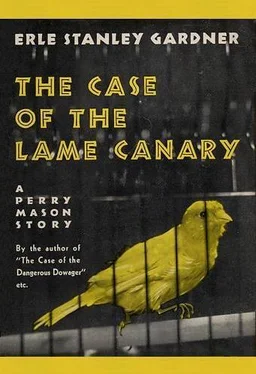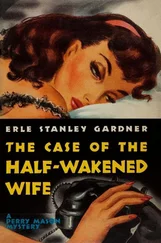Erle Gardner - The Case of the Lame Canary
Здесь есть возможность читать онлайн «Erle Gardner - The Case of the Lame Canary» весь текст электронной книги совершенно бесплатно (целиком полную версию без сокращений). В некоторых случаях можно слушать аудио, скачать через торрент в формате fb2 и присутствует краткое содержание. Город: New York, Год выпуска: 1937, Издательство: William Morrow, Жанр: Классический детектив, на английском языке. Описание произведения, (предисловие) а так же отзывы посетителей доступны на портале библиотеки ЛибКат.
- Название:The Case of the Lame Canary
- Автор:
- Издательство:William Morrow
- Жанр:
- Год:1937
- Город:New York
- ISBN:нет данных
- Рейтинг книги:4 / 5. Голосов: 1
-
Избранное:Добавить в избранное
- Отзывы:
-
Ваша оценка:
- 80
- 1
- 2
- 3
- 4
- 5
The Case of the Lame Canary: краткое содержание, описание и аннотация
Предлагаем к чтению аннотацию, описание, краткое содержание или предисловие (зависит от того, что написал сам автор книги «The Case of the Lame Canary»). Если вы не нашли необходимую информацию о книге — напишите в комментариях, мы постараемся отыскать её.
The Case of the Lame Canary — читать онлайн бесплатно полную книгу (весь текст) целиком
Ниже представлен текст книги, разбитый по страницам. Система сохранения места последней прочитанной страницы, позволяет с удобством читать онлайн бесплатно книгу «The Case of the Lame Canary», без необходимости каждый раз заново искать на чём Вы остановились. Поставьте закладку, и сможете в любой момент перейти на страницу, на которой закончили чтение.
Интервал:
Закладка:
“I remember it perfectly,” Mason said, winking across at Della Street.
“At the time you talked with me,” Carpenter went on, in the slow, deliberate voice of one who has trained himself not to do things in a hurry, “I felt that it would be far better to wait until your client had been appointed by the court before making any accounting. However, after taking the matter up with our legal department, we have concluded that perhaps it might be better to co-operate with you and not force you to take steps to ascertain the exact amount which—”
Mason impatiently interrupted the smooth cadences of the banker’s voice. “Never mind explaining,” he said. “How much is his balance?”
Carpenter cleared his throat. “Sixty-nine thousand, seven hundred and sixty-five dollars and thirty cents,” he said.
“Can you tell me how that’s been deposited?”
“The deposits,” Carpenter said, “were rather unusual.For the most part, they represented sums ranging from five to fifteen thousand dollars, deposited in cash.”
“By Walter Prescott personally?”
“As far as I am able to ascertain from our records and the recollection of the persons who handled the account, by Walter Prescott personally.”
“Thanks,” Mason said.
“And if we can be of any assistance to you in the future,” Carpenter said, “please ask for me personally, Mr. Mason.”
Mason said, “Okay,” dropped the receiver into place, and stared across at Della Street. “That,” he said, “doesn’t look very much as though we were sailing tomorrow.”
“Why not, Chief?”
“It means there’s another complicating circumstance which we haven’t considered; something which has to be ironed out before we can reach a solution.”
“Why does it have to be ironed out?”
“Because,” he told her, “a solution of any crime which doesn’t account for all of the various factors involved is no solution at all. Now, I’ve paid too much attention to the people the district attorney’s office suspect, and not enough to the victim. In the long run, Della, the essence of all successful detective work lies in reconstructing the life of the victim. That gives motivation, and motivation makes murders.
“Virtually every man has enemies. Sometimes they’re business enemies. More often they’re personal enemies, people who hate him, people who will look down their noses and say it’s too bad when they hear he’s bumped off, but who will be tickled to death just the same; but it takes a peculiar psychological build-up to perpetrate a murder. A man must have a certain innate ferocity, a certain lack of consideration, and, usually, a lack of imagination.”
“Why a lack of imagination?”
“I don’t know,” he said, “except that it’s nearly always true. I think imaginative people sympathize with the sufferings of others because they’re able to visualize those sufferings more keenly in their own minds. An unimaginative person, on the other hand, can’t visualize himself in the shoes of another. Therefore, he sees life only from his own selfish angle. Killers are frequently cunning, but they’re rarely original. They’re selfish, and usually determined. Of course, I’m not talking now about a murder which is the result of some sudden overpowering emotion.”
“Why couldn’t this murder be one of that type?” she asked.
“It could,” he admitted readily enough. “In that event, I’d say that Rita Swaine pulled the trigger. But, whether she was justified, is another question.”
“Would you represent her if she’s guilty?”
“It depends on what you mean by being guilty. I don’t necessarily define murder the same way the district attorney defines it. If there were circumstances of moral provocation, they might be just as compelling as circumstances of physical provocation. In other words, the law says that if a man is in a position to do you great bodily harm, or to kill you, and he comes at you, apparently for the purpose of putting a murderous intent into execution, you have the right to kill him. In other words, that’s a physical provocation. It’s all the law, in its blundering generality, can take into comprehension. But, how about the person who brings a crushing mental or moral pressure upon a more or less helpless victim? I admit circumstances like that aren’t common. But, with certain temperaments, they might be possible.”
“Chief,” she said, “will you please unfocus your mind long enough to get your clothes packed?”
“Not now,” he told her, frowning, and starting once more to pace the floor. “I’m going back to first principles and building up from there. Now then, let’s look at the victim — Walter Prescott — an unsocial individual — selfish, cruel, cold, ruthless— In short, just the type of person who could commit a murder.”
“But he didn’t commit a murder, Chief. He was murdered.”
Mason said, “That’s the puzzling part of it, Della. He should have been the murderer instead of the corpse.”
“This,” Della Street pointed out, “isn’t getting us any nearer China.”
“I think it is,” Mason said thoughtfully. “It sounds foolish, and yet I think it’s getting me some place. It’s paradoxical. The man who was murdered isn’t the man who was murdered, but the man who committed the murder. Now, if we can follow that contradictory premise through to a logical conclusion, Della, we’re certainly going to be one jump ahead of the police, because that’s a starting point of deductive reasoning which would never suggest itself to them.”
“No,” she admitted with a smile, “you win on that.”
“Now then,” Mason said, “let’s suppose that Walter Prescott is a murderer. Let’s suppose that what Jason Braun, alias Carl Packard, saw in the window of that house didn’t have to do with the murder of Walter Prescott but did have to do with the murder of someone else — someone Walter Prescott was killing.”
Della Street said, “You also win on that, Chief. I can’t conceive of the police being able to follow you into that line of reasoning.”
“It’s goofy,” he admitted, “and yet, somehow or other, I feel that I’m getting on the track of what really happened. Somehow, putting all these possibilities in words takes away that feeling of fumbling around in the dark. Now then, with that as a starting point, and considering that Packard saw something connected with a murder, who was the victim? If Walter Prescott had killed someone, who would he have killed? If he’d tried to kill someone, who was that someone, and what could Packard have seen— Wait a minute, Della— good Lord!”
Mason paused in his pacing, to stand in the middle of the floor, his legs spread apart. “Della,” he said slowly, “if what I think happened is actually the real solution, then—”
A series of knocks sounded on the door which led to the corridor. Mason said, “That’s Paul Drake. Let him in, Della, and see what he wants.”
Della Street crossed the room and opened the door.
“Hello, folks,” Drake said. “What’re you doing?”
“We’re engaging in a new form of logic,” Della answered with a grin. “It’s swell. It solves murders and everything.”
“Gimme,” Drake said, entering the room.
“Well, it goes like this,” Della said. “Because you’ve come in the room, you must have been the person going out of the room. Therefore, having gone out of the room while you were coming into the room, someone who saw you in the corridor coming into the room, would have known you were going out of the room, and—”
“Oh, I see,” Drake said, “like a puppy chasing his tail, huh?”
“Exactly,” Della agreed, “only the puppy catches his tail. Then, having swallowed himself, he becomes, so to speak, completely self-contained.”
Читать дальшеИнтервал:
Закладка:
Похожие книги на «The Case of the Lame Canary»
Представляем Вашему вниманию похожие книги на «The Case of the Lame Canary» списком для выбора. Мы отобрали схожую по названию и смыслу литературу в надежде предоставить читателям больше вариантов отыскать новые, интересные, ещё непрочитанные произведения.
Обсуждение, отзывы о книге «The Case of the Lame Canary» и просто собственные мнения читателей. Оставьте ваши комментарии, напишите, что Вы думаете о произведении, его смысле или главных героях. Укажите что конкретно понравилось, а что нет, и почему Вы так считаете.












